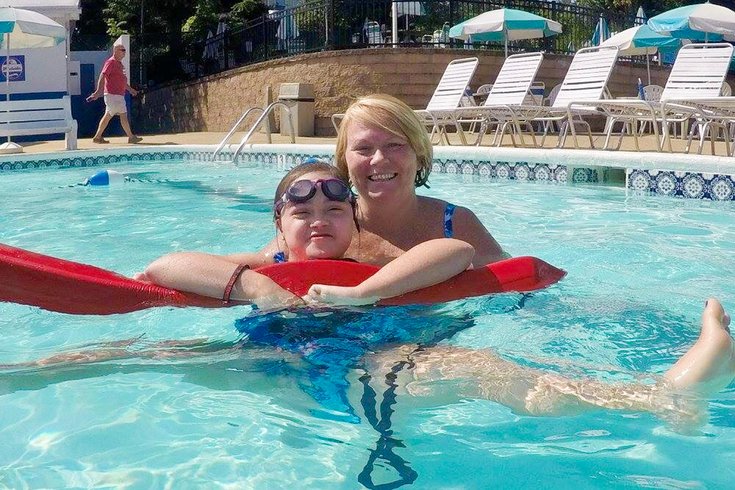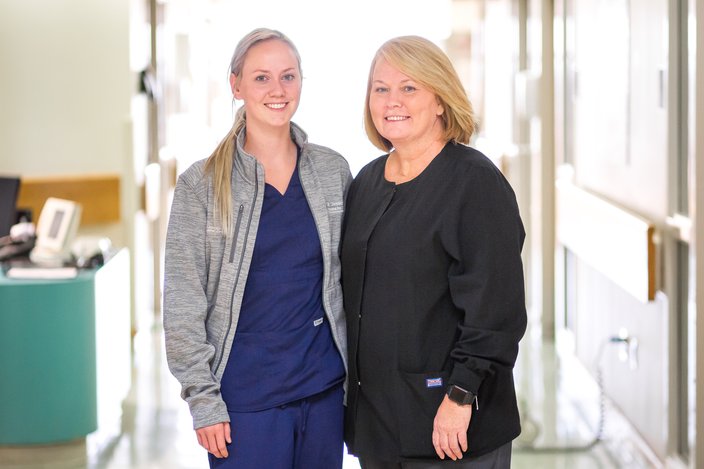
October 10, 2017
 Photo courtesy/Claire Alminde
Photo courtesy/Claire Alminde
Claire Alminde swims with one of the "junior lifeguards" in the pool at the Winchester Swim Club in Northeast Philadelphia. The nurse at St. Christopher's started the program for special needs students with her daughter seven years ago, and all her children participate as "big" lifeguards.
Claire Alminde has always taught her three children the importance of volunteering.
So it was natural for the whole family to get involved in creating a program for kids with special needs at their local pool, the Winchester Swim Club in Northeast Philadelphia.
“I try to teach my kids that volunteerism is a part of who you are. That you have to help people because it is important to be a kind and giving person,” said Alminde, a nursing manager in the Oncology Transplant Unit at St. Christopher’s Hospital for Children in Philadelphia, where she has worked for nearly 30 years.

Seven years ago, Alminde and her daughter, Claire Ann, then 15, observed something about the many special needs children at the swim club.
"(We) started to notice ... how these families pay the same amount for their membership but yet these kids are really not able to experience the full benefit like the other kids can,” said Alminde, 51, of Northeast Philadelphia.
At the time, Alminde was the swim and dive director and on the Winchester board of directors. She and her daughter met with the club's manager about developing a program that would pair up the children, or "junior lifeguards," with "big” lifeguards.
The first year of the program, Alminde’s three children and three kids from another family were the “big” lifeguards, working with five children with autism and two with Down syndrome.
To help identify their special needs, parents were asked to fill out a questionnaire about their child. It included questions about allergies and medical issues, but also asked parents what they hoped to get out of the program and how they thought their child would most benefit from the program. They were also asked to identify goals for their child.
Overall, three main goals were identified: water safety education, making friends and having fun.
“One of the most common goals was for their child to make friends," Alminde said. "That was one thing that was lacking for most families.”
“Water safety was also of utmost importance because of the families’ concern over their kids one day falling into the deep end of the pool and not being able to save themselves,” she added.
“It allows the families to reach the goal of their child making friends while also teaching typically developing kids about kids who may be a little different." – Claire Alminde, who founded a "Little Lifeguards" program at her local pool
So Alminde and the lifeguards teach survival swimming first and build up to more complicated skills –like diving off the board and swimming the length of the pool – for those who are interested.
While Alminde and her daughter train the “big” lifeguards at the start of the season each year, they recognized a need to provide training to all the lifeguards to improve their interaction with the kids in the program.
“Lifeguards typically communicate rules and rule violations with a whistle, but many of our junior lifeguards don’t respond to a whistle. For some it actually escalates their sensory issues," she said. "So we trained the lifeguards how to better communicate with our kids while they are on the stand."
 Thom Carroll/PhillyVoice
Thom Carroll/PhillyVoiceClaire Alminde MSN, RN, right, has worked at St. Christopher's Hospital for Children for nearly 30 years. Over the summer her daughter, Claire Ann Alminde, BSN, RN, started working in the critical care unit at the hospital. Together, they started up a program for special needs children at their local swim club – when Claire Ann was only 15.
Every Saturday during the summer, the children hit the pool for the hour before it opens, to work one-on-one on individualized goals. In many cases the training is tailored to the child's needs.
For example, Alminde said, one boy in the program constantly moves his hands, like he is calculating a math problem. And that is what he is doing.
"He is a math genius,” Alminde said. “So in order to get him to do anything in the pool to develop his swimming abilities we had to phrase every request in a way that has something to do with numbers. You would have to say, 'Can you kick your feet seven times?' instead of just 'Can you kick your feet?' ”
The program then meets again for an hour at the end of the day so the junior lifeguards can interact with other kids at the pool.
“It allows the families to reach the goal of their child making friends while also teaching typically developing kids about kids who may be a little different,” she said.
The program has grown over the years. This past summer, Alminde and five other "big" lifeguards worked with 10 junior lifeguards – seven on the autism spectrum and three with emotional needs. Three siblings also participated on invitation to help set goals for their brother or sister. One older brother of a boy with autism this summer set a goal for his brother to participate in a swim meet within the next three years.
Alminde told him at the beginning of the swim season, “I think we can probably do it this year.”
And on one special night this summer, his brother achieved that shared goal, taking part in his first swim meet while family and friends cheered from the sideline.
His brother and Claire Ann were in the lane with him and because he loves polar bears so much, she held up a plastic polar bear on a board for him to swim toward as he completed the 25-meter freestyle lap.
There were no swimmers with special needs from the competing team identified to participate in the meet, so two Winchester swimmers offered to “compete” against him instead.
“I told them that they didn’t have to let him win, but do me a favor when you are swimming, and take a minute to look over at him and see how happy he is," Alminde said. "It will make your heart happy."
For Alminde, the junior lifeguard program is literally her favorite thing. “I will cancel other things to make time for this because it is important," she said. "With autism on the rise, we need to find better ways to include these kids into everyday activities."
“(What) I didn’t anticipate,” she added, “was the support group that was created for the parents.”
Perhaps Alminde gets even more out of helping the "junior lifeguards" because her own children are by her side the whole time.